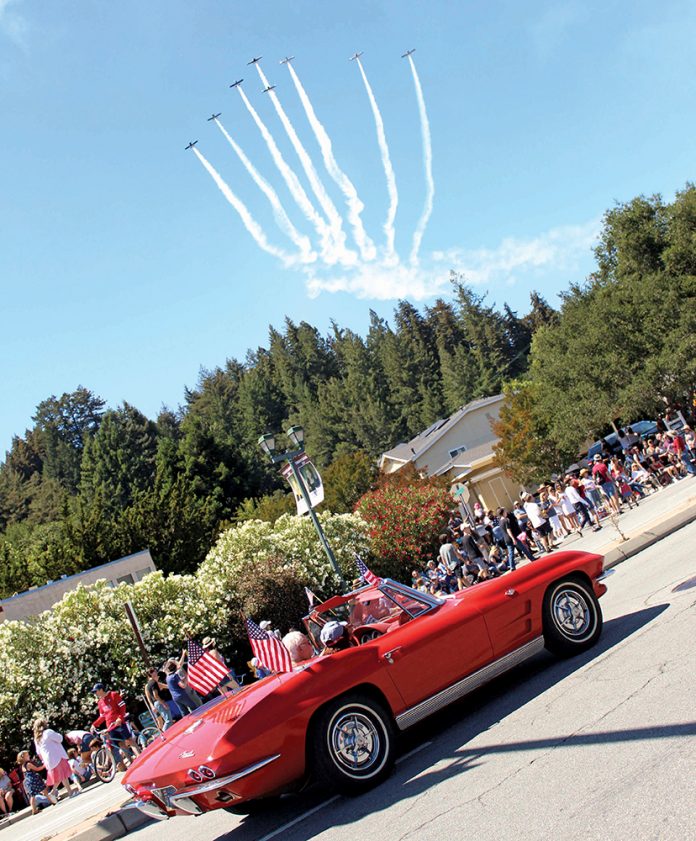Scotts Valley City Council during its March 2 meeting voted unanimously to fund Independence Day festivities with $70,000 the City’s General Fund.
But it technically won’t be a “Fourth of July” event, since they decided to have it on July 3, since vendors were already committed elsewhere for the following day.
Fireworks didn’t happen in 2020 or 2021 due to the pandemic. After being held virtually in 2020, mayor Donna Lind, then a councilwoman, spearheaded an in-person parade last year.
The City’s Parks and Recreation Division and the Scotts Valley Police Department—both of which have faced staffing challenges in the past couple of years—and the Park Advocates nonprofit have typically taken charge of Independence Day festivities. But the nonprofit recently began the process of being wound down after the state and IRS “determined it was not an independent entity and could no longer operate as a 501(c)(3) corporation,” according to staff.
SVPD has asked for new safety measures for this year’s rebirth.
Vice Mayor Jim Reed pointed out that, while the City will put in the money up front, it will likely generate significant revenue from ticket sales to offset this.
The City might even end up making money from the event, staff said in the report.
Sluggish Progress
While Scotts Valley has seen movement in some areas—such as the library renovation and the approval of a green bin system—in other areas (like the General Plan update, a carriage house project and fiscal sustainability rework) the City hasn’t made much progress, staff reported.
Lack of staff and limited consultant resources were a couple of reasons for the lack of results, according to City Manager Mali LaGoe.
The original timeline for some initiatives may have been overly ambitious, she suggested.
According to her report, Scotts Valley needs more support from consultants to move forward with a plan for accessory dwelling units, for design standards for mixed-use developments, for an Environmental Impact Report for the General Plan and for a development impact fee study.
In order to move the “inclusionary housing” boundaries to match the Scotts Valley perimeter, the City will need to get outside legal help, LaGoe noted.
However, the local economy is rebounding alongside the rest of California, and the City is in the process of disbursing $250,000 in grants, staff reported (although the small-business funding is, once again, being slowed by state paperwork requirements).
And Scotts Valley has selected a new permitting app called OpenGov that could expand its online and administrative capabilities.
LaGoe proposed holding a study session to reassess where things stand and to develop specific metrics that will allow officials to gauge future successes.
Meeting Tech Approved
Council agreed to spend $131,777 of its American Rescue Plan Act funds to upgrade Council Chambers’ information technology so it can hold hybrid meetings. West Sacramento-based to Conti, LLC, was the lone bid for the work, staff said.
It will provide three fixed cameras, update analog audio equipment to digital and install a tech screen to control the cameras, microphones and public comment timer. The system also includes five 21-inch screens for the room and will be able to stream to television, YouTube or other platforms.
The contract does not include upgrading IT systems at City Hall.
Staff said it will still be months before the work can be completed.
The new audio system will rely on a new QSC Core 110f Processor, feature 10 Shure Gooseneck microphones, new amplifiers, two wireless mics, six ceiling-mounted in Council Chambers and two new outdoor speakers for when packed public hearings and other assemblies spill outside.
Conti, LLC will also build in accessibility features.
The company has previously performed audio/visual installation work for the City of North Las Vegas, the Nashville Music City Center, Carmel by the Sea and San Joaquin County.
Council approved the spending unanimously.









